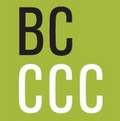The Walter A. Haas School of Business is the business school of the University of California, Berkeley, a public research university in Berkeley, California. It was the first business school at a public university in the United States.
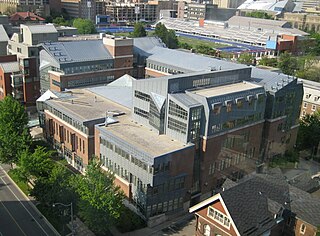
The Joseph L. Rotman School of Management is the University of Toronto's graduate business school, located in Downtown Toronto. The University of Toronto has been offering undergraduate courses in commerce and management since 1901, but the business school was formally established in 1950 as the Institute of Business Administration. The name was changed to the Faculty of Management Studies in 1972 and subsequently shortened to the Faculty of Management in 1986. The school was renamed in 1997 after Joseph L. Rotman (1935–2015), its principal benefactor.

The Robert Emmett McDonough School of Business, commonly shorted to the McDonough School of Business and abbreviated as the MSB, is the business school of Georgetown University in Washington, D.C. Founded in 1957, it grants both undergraduate and graduate degrees, and is one of the university's nine constituent schools. Since 1998, the school has been named in honor of Georgetown alumnus Robert Emmett McDonough.
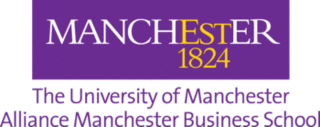
Alliance Manchester Business School is the business school of the University of Manchester in Manchester, England. It is one of the oldest business schools in the UK, and provides education to undergraduates, postgraduates and executives.

The Joseph M. Katz Graduate School of Business is the graduate business school of the University of Pittsburgh located in Pittsburgh, Pennsylvania. Although business education had its origins at the university in 1907, the Graduate School of Business was established in 1960 from a merger of its predecessors, the School of Business Administration and the Graduate School of Retailing. It was renamed in 1987 after businessman and university alumnus benefactor Joseph Katz.
The Eli Broad College of Business is the business college at Michigan State University. The college has programs in accounting, finance, human resource management, management, marketing, supply chain management, and hospitality business, which is an independent, industry-specific school within the Broad College. This independent, industry-specific school has 800 admitted undergraduate students and 36 graduate students not included in the college's totals.

The Questrom School of Business is the business school of Boston University, a private research university based in Boston. Founded in 1913 and formerly known as the School of Management, the school received its current name in 2015.
The University of Connecticut (UConn) School of Business is the University of Connecticut's graduate and undergraduate public business school. It spans across four campuses, with the main campus located in Storrs, Connecticut.
The Penn State Smeal College of Business at the Pennsylvania State University offers undergraduate, graduate, and executive education programs to more than 6,000 students. Accredited by the Association to Advance Collegiate Schools of Business (AACSB), Smeal, is home to more than 150 faculty members who teach and conduct academic research on a range of business topics. The college also features a network of industry-supported research centers.
The Leonard N. Stern School of Business is the business school of New York University, a private research university based in New York City. Founded as the School of Commerce, Accounts and Finance in 1900, the school received its current name in 1988.

The Tippie College of Business, also known as Tippie, is the business school located at the University of Iowa in Iowa City, Iowa. Established as the College of Commerce in 1921, Tippie is one of the oldest and highest-ranked business schools in the United States. The college is named after 1949 graduate Henry B. Tippie, marking the first academic division at the University of Iowa to be named after an alumnus. The college is located in the Pappajohn Business Building, which is named after 1952 graduate Des Moines venture capitalist John Pappajohn. Since 1923, the college has held the gold standard of accreditation, the Association to Advance Collegiate Schools of Business (AACSB). Today, with over 50,000 alumni and 4,700 students in programs spanning from BBAs to PhDs; the college houses six academic departments, 12 centers and institutes, and four student-managed endowment funds.
The Isenberg School of Management is the business school and also the second largest school at the University of Massachusetts Amherst, the flagship campus for the University of Massachusetts system. The Isenberg School is accredited by the AACSB International and ACPHA.

The C.T. Bauer College of Business is the business school of the University of Houston, and is fully accredited by the AACSB International. It offers BBA, MBA, MS Accountancy, MS Finance and the Houston metropolitan area's only Ph.D. program in business administration.

The D'Amore-McKim School of Business is the business school of Northeastern University in Boston, Massachusetts. The business program was founded in 1922, followed by the Graduate School of Business Administration in 1952.

Saunders College of Business is one of eleven colleges at Rochester Institute of Technology and is accredited by the Association to Advance Collegiate Schools of Business International (AACSB). As of fall semester 2018, Saunders College of Business encompasses nearly 11% of RIT's enrollment, home to more than 2,000 undergraduate and graduate students enrolled in programs across RIT Global Campuses in Rochester, New York, Croatia, Dubai, Kosovo, and China.
The Guanghua School of Management, Peking University (北京大学光华管理学院) is the business school of Peking University, a public university in Beijing, China.
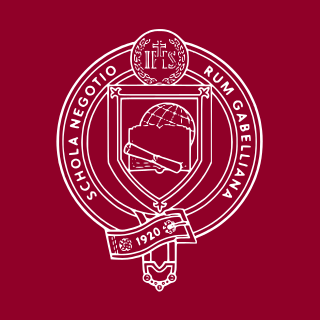
The Gabelli School of Business is the undergraduate and graduate business school of Fordham University, a private Jesuit research university in New York City, New York.

Carl H. Lindner College of Business, also referred to as "Lindner" and "Lindner College," is a college of the University of Cincinnati. The college is located in Carl H. Lindner Hall. On June 21, 2011, the college was named after Carl Henry Lindner, Jr. in honor of the contributions he has made to the university, college, and the business community. The college has three undergraduate degree options, five master's degrees, and a doctoral program spread out over seven departments.
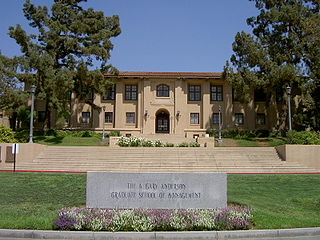
The School of Business at the University of California, Riverside is home to the largest undergraduate business program in the University of California system, as well as the A. Gary Anderson Graduate School of Management.

The Charles H. Lundquist College of Business is the University of Oregon's business school. Founded in 1914, the Lundquist College offers undergraduate degree programs in business administration and accounting, as well as MBA, Executive MBA, Master of Science in Sports Product Management, Master of Accounting, Master of Science in Finance, and PhD graduate programs. These degree programs are supported by four departments and one school of accounting.



